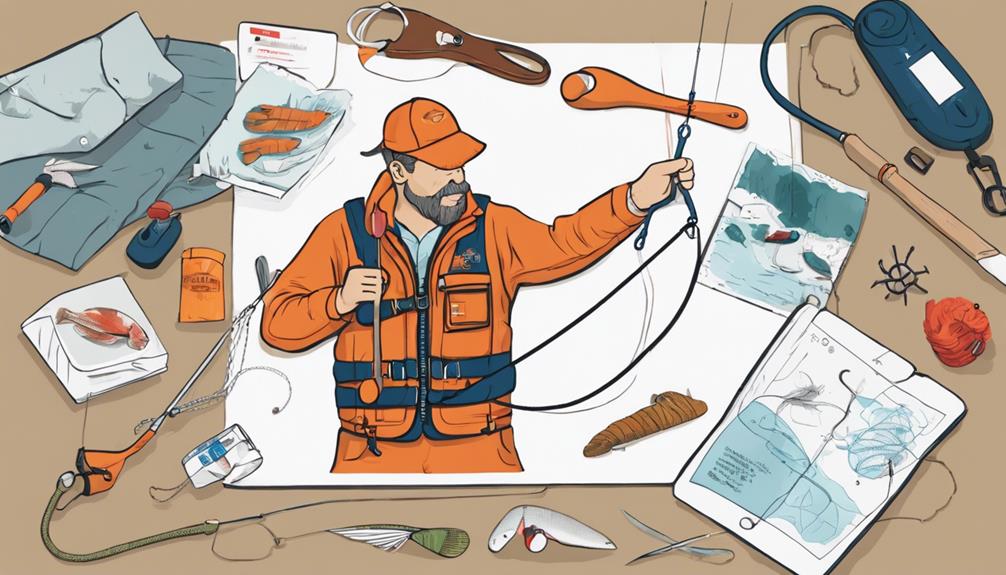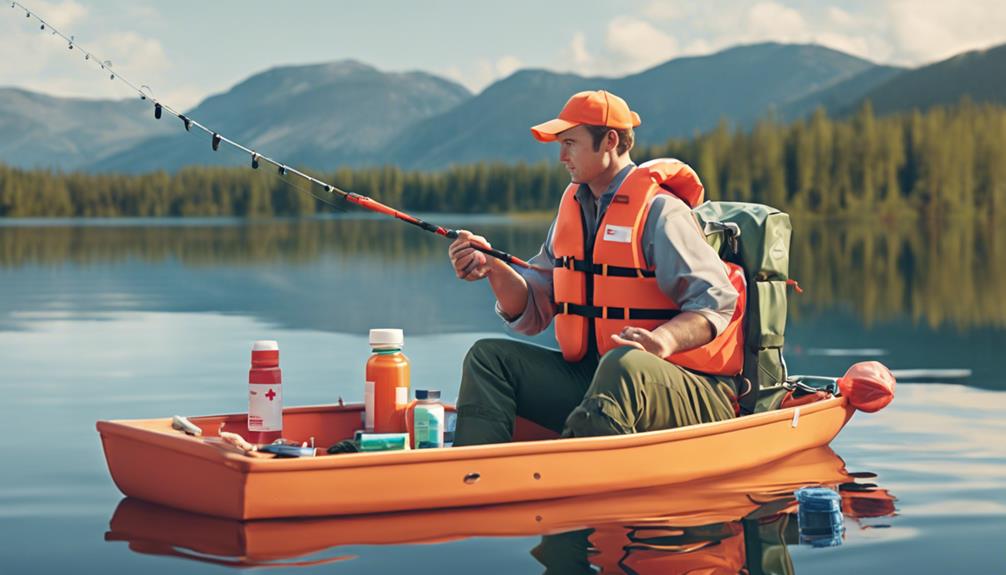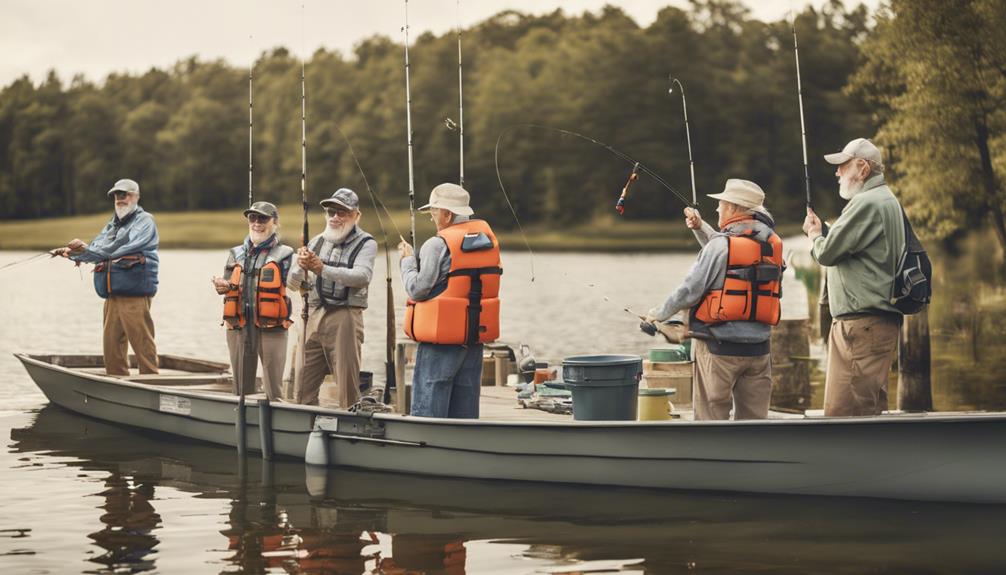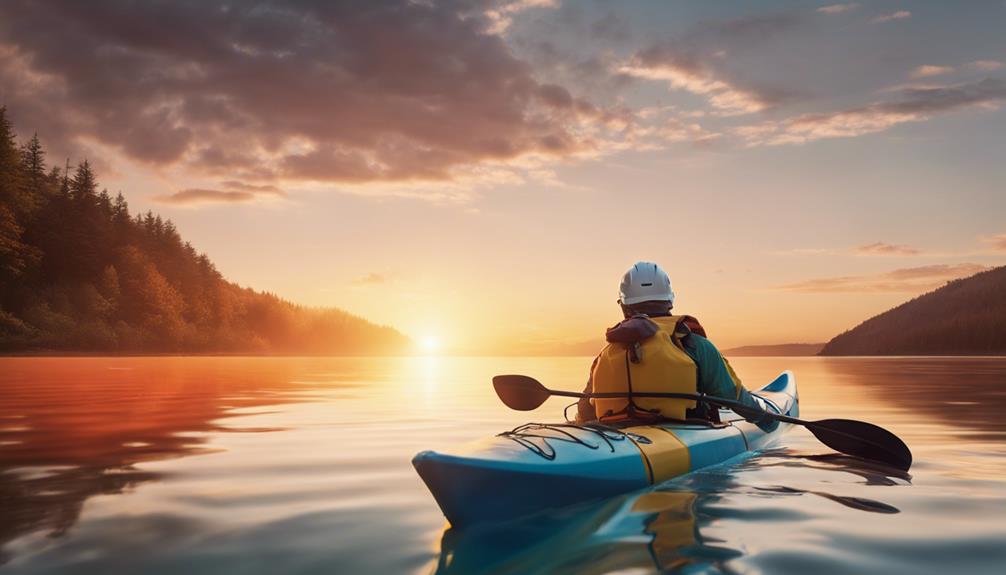Did you know that wearing a life jacket while boat fishing can significantly increase your chances of survival in case of an emergency?
However, there are seven more crucial safety tips to keep in mind for a successful and secure fishing trip on the water.
Make sure you're prepared for any situation that may arise by following these key guidelines.
Life Jackets
Make sure to always wear your life jacket while out on the boat for fishing trips. The proper fit of your life jacket is crucial for your safety on the water. When it comes to life jackets, one size doesn't fit all. Ensure that your life jacket fits snugly but comfortably. A life jacket that's too loose may slip off when you need it most, while one that's too tight can restrict your movement and breathing. The importance of wearing a life jacket can't be overstated. In case of an emergency, a life jacket can keep you afloat and save your life, especially if you're in deep or rough waters.
Before setting out on your fishing trip, check that everyone on board has a properly fitting life jacket. Encourage your fellow anglers to wear their life jackets at all times while on the boat. Accidents on the water can happen suddenly, so it's best to be prepared. Even if you consider yourself a strong swimmer, unexpected circumstances like strong currents or injuries can quickly turn a fun fishing outing into a life-threatening situation. Stay safe and enjoy your fishing adventure by making sure that everyone wears their life jackets. Remember, it's better to be safe than sorry.
Weather Awareness
Ensure you stay informed about weather conditions before heading out on your fishing trip to guarantee a safe and enjoyable experience on the water. Cloud patterns and wind direction are crucial indicators to pay attention to when assessing the weather for your boat fishing expedition.
Cloud patterns can give you valuable information about upcoming weather changes. Dark, towering clouds often signal an incoming storm, while fluffy white clouds against a blue sky typically indicate fair weather. Keep an eye out for rapid changes in cloud formations, as this could signify approaching inclement weather.
Wind direction is another essential factor to consider. Understanding wind patterns can help you anticipate how the weather might evolve throughout your fishing trip. Wind blowing from the east could indicate an approaching storm, while consistent winds from the west might suggest stable weather conditions.
Emergency Equipment
Having appropriate emergency equipment onboard is vital for ensuring your safety during boat fishing expeditions. Before heading out, make sure you have essential items such as life jackets, a first aid kit, a flashlight, a whistle, and a throwable flotation device. These items can be crucial in various emergency situations that may arise while out on the water.
Emergency drills are also important to practice with everyone on board. Ensure that all passengers know where emergency equipment is located and how to use it. Conducting drills for scenarios such as man overboard situations or onboard fires can help everyone be prepared and react quickly if an actual emergency occurs.
A well-stocked first aid kit is a must-have onboard. Include items like bandages, antiseptic wipes, adhesive tape, pain relievers, seasickness medication, and any necessary personal medications for those on board. Knowing how to administer basic first aid can make a significant difference in emergencies where medical help may be delayed.
Safe Anchoring
When anchoring your boat for fishing, always check the anchor line for any signs of wear or damage before securing it. Proper technique is crucial to ensure a safe and successful anchoring experience. Start by determining the anchoring depth based on the water conditions and the size of your boat. A general rule of thumb is to use a scope of 7:1, meaning that for every foot of water depth, let out seven feet of anchor line. This helps provide sufficient holding power for your anchor.
When dropping the anchor, lower it slowly to the bottom while keeping a firm grip on the anchor line. Once the anchor has reached the seabed, allow the boat to drift back naturally as you pay out the anchor line. Avoid throwing the anchor overboard, as this can lead to tangles or the anchor not setting properly.
After the anchor is set, secure the anchor line to a cleat on your boat, making sure it's properly cleated off to avoid any slippage. Double-check that the anchor is holding securely by gently testing it in reverse with the engine. If the anchor drags, you may need to reset it or choose a different anchoring location.
Boat Maintenance
Inspecting your boat regularly is essential for ensuring its proper functioning and longevity. Preventative care and regular inspections are crucial to maintaining your boat in top condition. Here are three key maintenance tips to keep in mind:
- Check for Leaks: Regularly inspect your boat for any signs of leaks. Look for water accumulation, especially after outings, and investigate the source of any leaks promptly. Addressing leaks early can prevent more significant issues down the line and ensure your safety on the water.
- Monitor Engine Health: Your boat's engine is its heart, so regular engine maintenance is vital. Check oil levels, cooling systems, and fuel filters according to the manufacturer's guidelines. Keep an eye out for any unusual sounds or vibrations while the engine is running, and address any concerns immediately to prevent breakdowns during your fishing trips.
- Clean and Protect: Regularly clean your boat inside and out to prevent corrosion and damage. Saltwater can be particularly harsh on boat surfaces, so rinsing with fresh water after each use is essential. Additionally, apply protective coatings or wax to maintain your boat's appearance and structural integrity for years to come.
Communication Devices
Regularly ensuring the proper functioning of communication devices on your boat is essential for maintaining safety and connectivity while out on the water. In case of emergencies, having reliable communication tools can make a significant difference in getting help quickly. It's crucial to test your devices before each trip to ensure they're in good working condition.
Emergency protocols should be established and clearly communicated to everyone on board. Make sure all passengers know how to use the communication devices and whom to contact in case of an emergency. Having a designated person in charge of communication can help streamline the process during stressful situations.
Signal flares are another important tool to consider adding to your emergency kit. These can be used to attract attention if you find yourself in distress and need assistance. Familiarize yourself with the different types of signal flares and how to use them properly.
Remember that communication devices are only effective if they're functioning correctly and if you know how to use them. Taking the time to inspect, test, and understand your communication tools can greatly enhance safety while boat fishing. Stay prepared, stay connected, and stay safe out on the water.
Know Your Surroundings

Ensure your awareness of the water conditions and surroundings plays a crucial role in staying safe while boat fishing. Environmental awareness and navigation skills are essential to help you navigate the waters effectively and prevent potential dangers. Here are three key points to keep in mind:
- Stay Alert: Always be mindful of changing weather conditions and how they might impact your fishing trip. Sudden storms or strong winds can pose serious risks, so staying informed about the weather forecast before heading out is vital for your safety.
- Observe Water Traffic: Pay attention to other boats and watercraft in your vicinity. Understanding basic navigation rules and being aware of the movement of other vessels can help you avoid collisions and ensure a smooth fishing experience.
- Know Your Location: Familiarize yourself with the area where you plan to fish. Understanding the topography of the water body, such as shallow areas or underwater obstacles, can prevent accidental grounding or damage to your boat. Additionally, knowing the location of emergency services or safe harbors can be crucial in case of an unexpected situation.
Fishing Buddy System
Consider partnering up with a fishing buddy to enhance safety and enjoyment during your boat fishing excursions. Implementing a fishing buddy system can significantly improve your overall experience on the water while ensuring that safety protocols are followed. Having a buddy with you means there's someone to assist in case of emergencies, provide help if you get injured, or even just lend a hand with tricky fishing situations.
When utilizing the buddy system, make sure to establish clear communication about safety procedures before setting out. Discuss things like how to respond to potential dangers, what to do in case of a man overboard situation, and how to coordinate actions during challenging fishing moments. By working together and looking out for each other, you can mitigate risks and handle unexpected events more effectively.
Additionally, having a fishing buddy onboard can offer a sense of camaraderie and companionship, making your fishing trips more enjoyable and memorable. Sharing the excitement of a big catch or supporting each other through slow fishing periods can enhance the overall satisfaction of your outings. Remember that safety should always be the top priority, and by adopting a fishing buddy system, you're not only increasing safety but also adding a new dimension of fun to your boat fishing adventures.
Frequently Asked Questions
What Is the Best Type of Sunscreen to Use While Fishing on a Boat?
When fishing on a boat, the best type of sunscreen for you to use is water-resistant sunscreen. This type of sunscreen will provide you with sun protection even when you're surrounded by water.
Make sure to apply it generously and reapply it regularly, especially after swimming or sweating. Look for a broad-spectrum sunscreen with an SPF of 30 or higher to ensure you're well protected from the sun's harmful rays.
Are There Any Specific Regulations or Restrictions for Fishing in Certain Bodies of Water?
When it comes to fishing in certain bodies of water, you should always check for any fishing permits required and be aware of waterway restrictions.
Some areas may have specific regulations on the type of fish you can catch, the size limits, or the number of fish allowed to be taken per day.
It's important to respect these rules to ensure sustainable fishing practices and conservation of marine life.
How Can I Prevent Seasickness While Fishing on a Boat?
To prevent seasickness while fishing on a boat, you can try a few things.
First, focus on the horizon to help your body adjust to the motion. Ginger tea or ginger candies are natural remedies that can ease nausea. Also, consider taking over-the-counter medications like Dramamine before heading out.
Stay hydrated and avoid heavy or greasy foods. Remember, prevention is key to enjoying your fishing trip without feeling seasick.
What Types of Fish Are Commonly Caught While Boat Fishing?
When you're boat fishing, you can expect to catch a variety of fish species. Common catches include bass, trout, salmon, and catfish. Catch rates can vary depending on the location and time of year.
Some areas are known for high catch rates of certain species, while others may offer a more diverse range of fish to reel in. Be prepared for a thrilling fishing experience with these popular catches.
Is There a Specific Way to Properly Dispose of Fishing Line and Other Waste While on a Boat?
When on a boat, it's important to dispose of fishing line and other waste properly. Proper waste disposal helps protect the environment and wildlife.
You can look for recycling options for items like fishing line, plastic bottles, and cans. Always make sure to keep your boat clean and tidy by disposing of trash in designated bins or bringing it back to shore for proper disposal.
Conclusion
So remember, always wear your life jacket, stay aware of the weather, have emergency equipment on board, and anchor safely.
Maintain your boat regularly, carry communication devices, know your surroundings, and use the fishing buddy system.
By following these key safety tips, you can enjoy your boat fishing adventures with peace of mind and ensure a fun and safe experience on the water. Stay safe and happy fishing!



